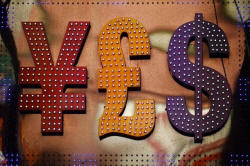|
 Dollar
on the back foot, sterling unsettled by politics Dollar
on the back foot, sterling unsettled by politics
 Send a link to a friend
Send a link to a friend
[March 21, 2016]
By Ian Chua
SYDNEY (Reuters) - The dollar stayed on the
defensive early on Monday, having extended its losses for a third week
in the wake of dovish signals from the Federal Reserve.
|
|
 Investors also gave sterling a wide berth after British Prime
Minister David Cameron was forced into a hasty cabinet reshuffle on
Saturday following the shock resignation of a senior minister. Investors also gave sterling a wide berth after British Prime
Minister David Cameron was forced into a hasty cabinet reshuffle on
Saturday following the shock resignation of a senior minister.
The pound was marked as far down as $1.4430, but has since returned
to $1.4463, 0.1 percent lower on the day.
The dollar index was little changed at 95.063, not far from a
five-month trough of 94.578 set on Friday. It had trimmed some of
its losses as investors lightened bearish positions ahead of the
weekend.
Whether the market will resume selling remained to be seen with
liquidity in Asia likely to be dampened by a holiday in Japan.
Japanese markets reopen on Tuesday.
The greenback fetched 111.51 yen , still within reach of Friday's
17-month low of 110.67. The euro, which last week scaled a one-month
peak of $1.1342, stood at $1.1271.

Dollar bulls were hit hard last week after the Fed held interest
rates steady and cut in half the number of projected quarter-point
hikes to just two this year.
Fed Chair Janet Yellen also sounded doubtful that a recent firming
in U.S. inflation would be sustained, suggesting the central bank is
in no hurry to tighten policy.
Analysts at ANZ said removing two full hikes from the baseline
projections was a significant move for the Fed at a time the U.S.
economy still looked in pretty good shape.
"Of course it could be a move that is fully justified if global
economic conditions do continue to deteriorate," they wrote in a
note to clients.
[to top of second column] |

"But one still has to wonder if the Fed is reverting back into old
habits of providing markets with additional stimulus every time they
throw a tantrum."
The European Central Bank (ECB) was also looking to soothe market
nerves. Its chief economist, Peter Praet, on Friday said rates have
not reached their lower limit yet.
He told a newspaper interview the ECB can cut rates again if the
euro zone's economy fails to pick up and, under extreme
circumstances, the bank might even consider printing money and
giving it out directly to people.
Praet's comments came a week after ECB President Mario Draghi upset
the market by saying he did not expect further rate cuts were needed
after unveiling a fresh set of stimulus.
(Editing by Richard Pullin)
[© 2016 Thomson Reuters. All rights
reserved.] Copyright 2016 Reuters. All rights reserved. This material may not be published,
broadcast, rewritten or redistributed.
 |